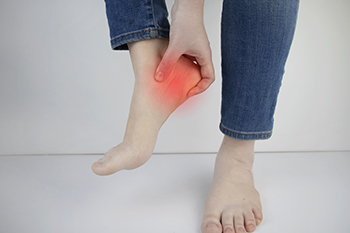Policeman’s Heel, Jogger’s Heel, and Plantar Fasciitis Are Similar
Tuesday, 31 May 2022 00:00
The foot condition that is known as plantar fasciitis has been known to be similar to policeman’s heel or jogger’s heel. The pain that is associated with this condition is felt in the heel, and can become unbearable while walking or standing. The pain may intensify in the morning after arising. The plantar fascia is found on the bottom of the foot, and connects the heel to the toes. It is a shock absorber, and supports the arch in the foot. Plantar fasciitis occurs when this portion of tissue becomes irritated, and this can happen from wearing shoes that do not fit correctly. Additionally, it may happen from standing on hard surfaces for the majority of the day. The risk of developing plantar fasciitis may increase in patients who are overweight, or in people who frequently run. Some people have a tight Achilles tendon, which is the tendon that connects the heel to the calf muscles, and this can lead to plantar fasciitis. There are specific stretches that can be practiced which may help to diminish the pain. If you are afflicted with plantar fasciitis, it is suggested that you speak with a podiatrist as quickly as possible so correct treatment can begin.
Plantar fasciitis is a common foot condition that is often caused by a strain injury. If you are experiencing heel pain or symptoms of plantar fasciitis, contact Dr. Mark Spier from Maryland. Our doctor can provide the care you need to keep you pain-free and on your feet.
What Is Plantar Fasciitis?
Plantar fasciitis is one of the most common causes of heel pain. The plantar fascia is a ligament that connects your heel to the front of your foot. When this ligament becomes inflamed, plantar fasciitis is the result. If you have plantar fasciitis you will have a stabbing pain that usually occurs with your first steps in the morning. As the day progresses and you walk around more, this pain will start to disappear, but it will return after long periods of standing or sitting.
What Causes Plantar Fasciitis?
- Excessive running
- Having high arches in your feet
- Other foot issues such as flat feet
- Pregnancy (due to the sudden weight gain)
- Being on your feet very often
There are some risk factors that may make you more likely to develop plantar fasciitis compared to others. The condition most commonly affects adults between the ages of 40 and 60. It also tends to affect people who are obese because the extra pounds result in extra stress being placed on the plantar fascia.
Prevention
- Take good care of your feet – Wear shoes that have good arch support and heel cushioning.
- Maintain a healthy weight
- If you are a runner, alternate running with other sports that won’t cause heel pain
There are a variety of treatment options available for plantar fasciitis along with the pain that accompanies it. Additionally, physical therapy is a very important component in the treatment process. It is important that you meet with your podiatrist to determine which treatment option is best for you.
If you have any questions, please feel free to contact one of our offices located in Columbia and Reisterstown, MD . We offer the newest diagnostic and treatment technologies for all your foot care needs.









